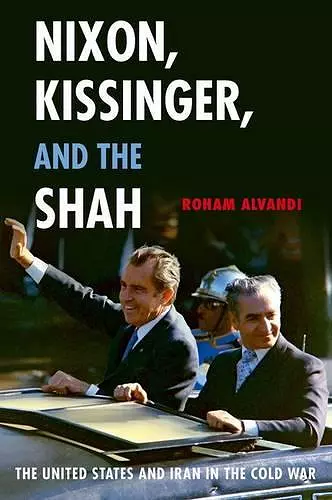Nixon, Kissinger, and the Shah
The United States and Iran in the Cold War
Format:Hardback
Publisher:Oxford University Press Inc
Published:5th Jun '14
Currently unavailable, and unfortunately no date known when it will be back
This hardback is available in another edition too:
- Paperback£32.49(9780190610685)

Listed as one of Tony Barber's History books of the Year, Financial Times Summer Books 2014
In this revisionist account of U.S.-Iran relations during the Cold War, Roham Alvandi provides a detailed historical study of the partnership that Shah Mohammad Reza Pahlavi of Iran forged with U.S. President Richard Nixon and his adviser Henry Kissinger in the 1970s.Mohammad Reza Pahlavi, the last shah of Iran, is often remembered as a pliant instrument of American power during the Cold War. In this book Roham Alvandi offers a revisionist account of the shah's relationship with the United States by examining the partnership he forged with Richard Nixon and Henry Kissinger in the 1970s. Based on extensive research in the British and U.S. archives, as well as a wealth of Persian-language diaries, memoirs and oral histories, this study restores agency to the shah as an autonomous international actor and suggests that Iran evolved from a client to a partner of the United States under the Nixon Doctrine. Nixon, Kissinger, and the Shah offers a detailed account of three key historical episodes in the Nixon-Kissinger-Pahlavi partnership that shaped the global Cold War far beyond Iran's borders. First, the book examines the emergence of Iranian primacy in the Persian Gulf as the Nixon administration looked to the shah to fill the vacuum created by the British withdrawal from the region in 1971. Then it turns to the peak of the partnership after Nixon and Kissinger's historic 1972 visit to Iran, when the shah succeeded in drawing the United States into his covert war against Iraq in Kurdistan. Finally, the book focuses on the decline of the partnership under Nixon's successor, Gerald Ford, through a history of the failed negotiations from 1974 to 1976 for an agreement on U.S. nuclear exports to Iran. Taken together, these three episodes map the rise of the fall of Iran's Cold War partnership with the United States during the decade of superpower détente, Vietnam, and Watergate.
Roham Alvandi's Nixon, Kissinger, and the Shah does exactly what it promises in its title. The book is an excellent insight into the interactions between the three aforementioned figures in what was a pivotal period of US, Iranian, and Cold War history. Alvandi's skill is writing in such a way as to appeal to the specialist and non-specialist alike. He weaves through a deep history, placing his triumvirate of characters in context without getting bogged down in unnecessary detail, and delivers a highly readable and effective study. * Stephen McGlinchey, E-International Relations *
lively, clear and entertaining writing. This is indeed a useful, highly recommendable book that may attract specialists in international relations, Iranian affairs and US political history, as well as the general reader. * David Sarias Rodriguez, History *
a major contribution to recent scholarship on the global history of the Cold War ... Alvandi's account of the process and its consequences is the fullest and most revealing to date. * David S. Painter, American Historical Review *
Alvandi's commendably clear style and approach serves to highlight and articulate an argument ... redefining the relationship between Iran and the United States away from the popular orthodoxy of the patron-client relationship ... Alvandi takes a refreshing look at a relationship that has long been considered both the high tide of USIran relations and the roots of its eventual collapse. * Ali M. Ansari, English Historical Review *
ISBN: 9780199375691
Dimensions: 160mm x 241mm x 23mm
Weight: 490g
270 pages